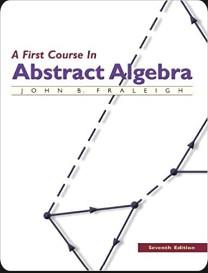a. Show that 2 is equal to the product of a unit and the square of an
Question:
a. Show that 2 is equal to the product of a unit and the square of an irreducible in Z[i].
b. Show that an odd prime p in Z is irreducible in Z[i] if and only if p ≡ 3 (mod 4). (Use Theorem 47.10.)
Data from Theorem 47.10
Let p be an odd prime in Z. Then p = a2 + b2 for integers a and b in Z if and only if p ≡ 1 (mod 4).
Proof First, suppose that p = a2 + b2. Now a and b cannot both be even or both be odd since p is an odd number. If a= 2r and b = 2s + 1, then a2 + b2 = 4r2 + 4(s2 + s) + 1, so p ≡ 1 (mod 4). This takes care of one direction for this "if and only if" theorem. For the other direction, we assume that p ≡ 1 (mod 4). Now the multiplicative group of nonzero elements of the finite field ZP is cyclic, and has order p - 1. Since 4 is a divisor of p - 1, we see that ZP contains an element n of multiplicative order 4. It follows that n2 has multiplicative order 2, so n2 = -1 in ZP. Thus in Z, we have n2 ≡ -1 (mod p ), so p divides n2 + 1 in Z.
Viewing p and n2 + 1 in Z[i], we see that p divides n2 + 1 = (n + i)(n - i). Suppose that p is irreducible in Z[i]; then p would have to divide n + i or n - i. If p divides n + i, then n + i = p(a + bi) for some a, b ∈ Z. Equating coefficients of i, we obtain 1 = pb, which is impossible. Similarly, p divides n - i would lead to an impossible equation -1 = pb. Thus our assumption that p is irreducible in Z[i] must be false. Since p is not irreducible in Z[i], we have p = (a + bi)(c + di) where neither a + bi nor c + di is a unit. Taking norms, we have p2 = (a2 + b2)(c2 + d2) where neither a2 + b2 = 1 nor c2 + d2 = 1. Consequently, we have p = a2 + b2, which completes our proof. [Since a2 + b2 = (a + bi)(a - bi), we see that this is the factorization of p, that is, c + di = a - bi.]
Step by Step Answer:






